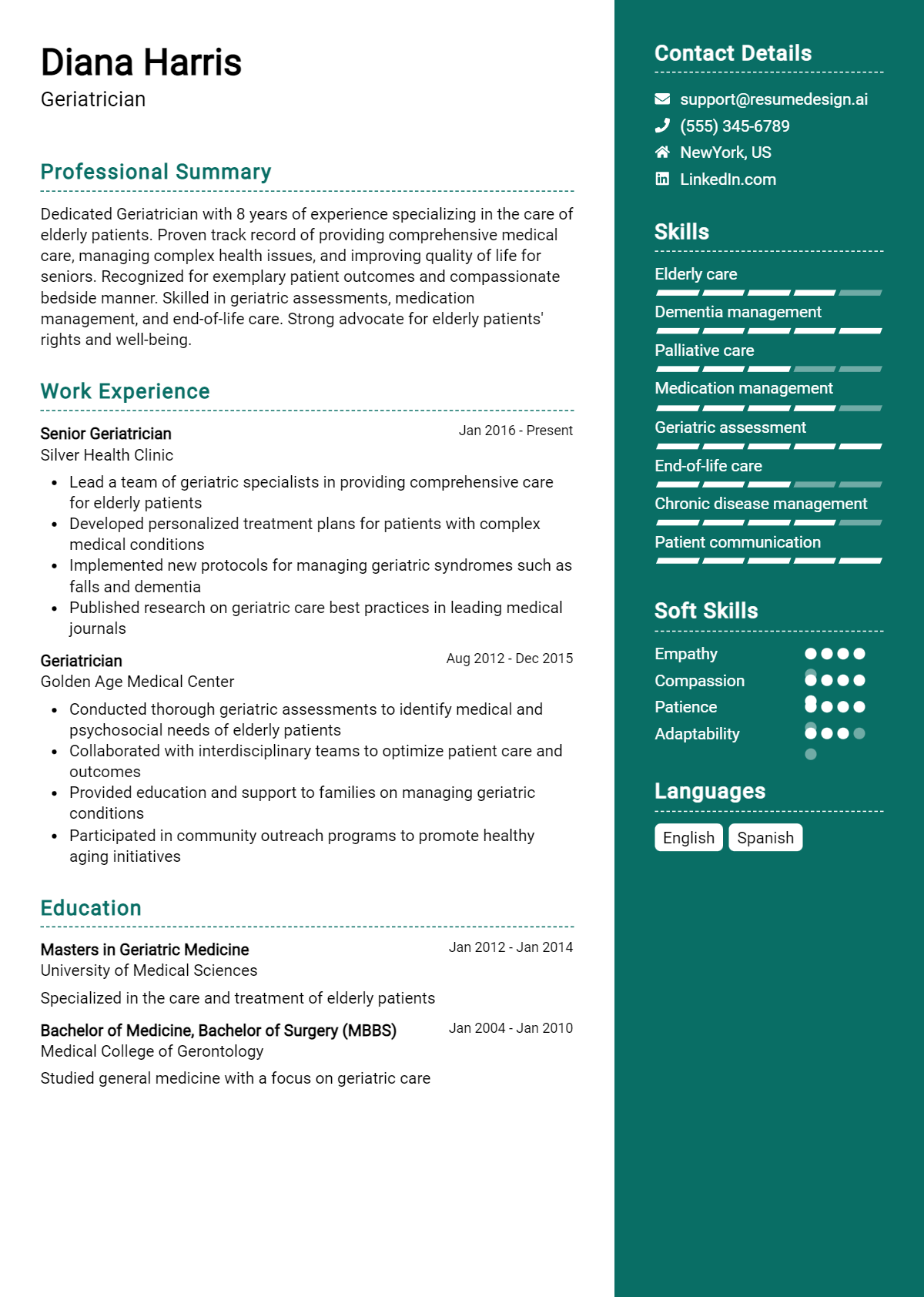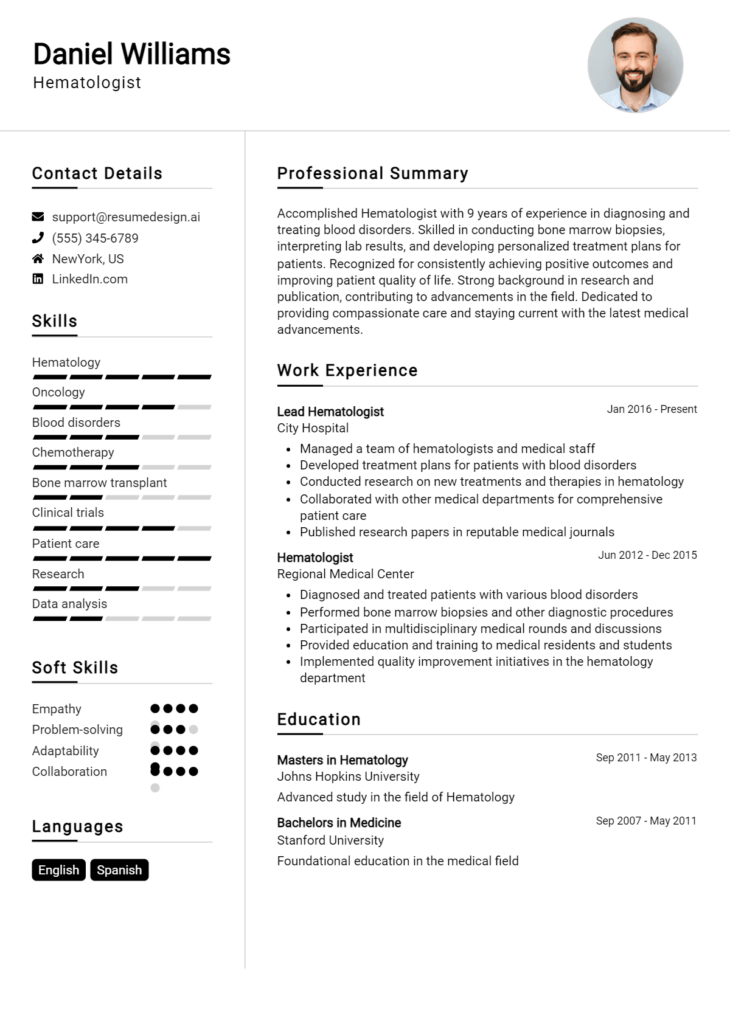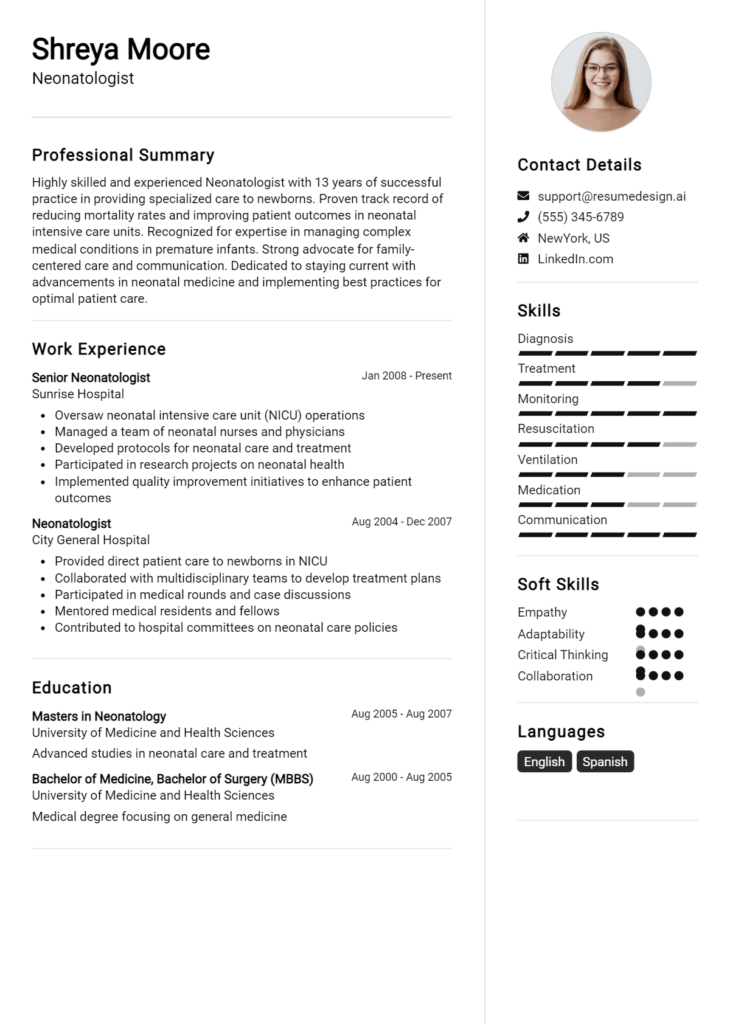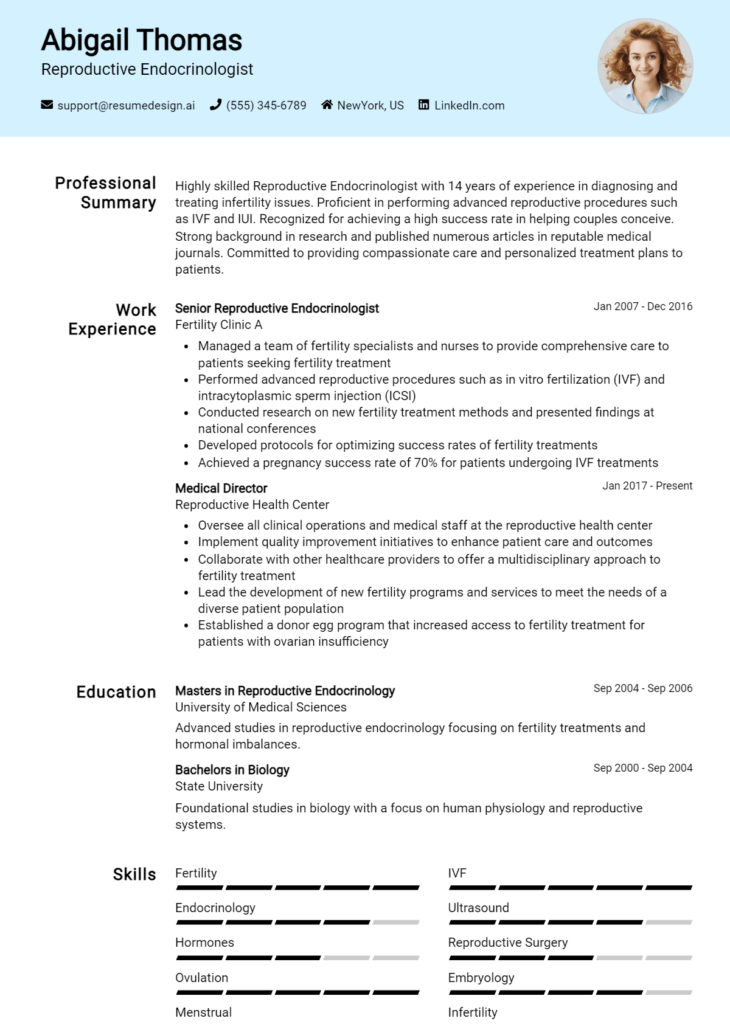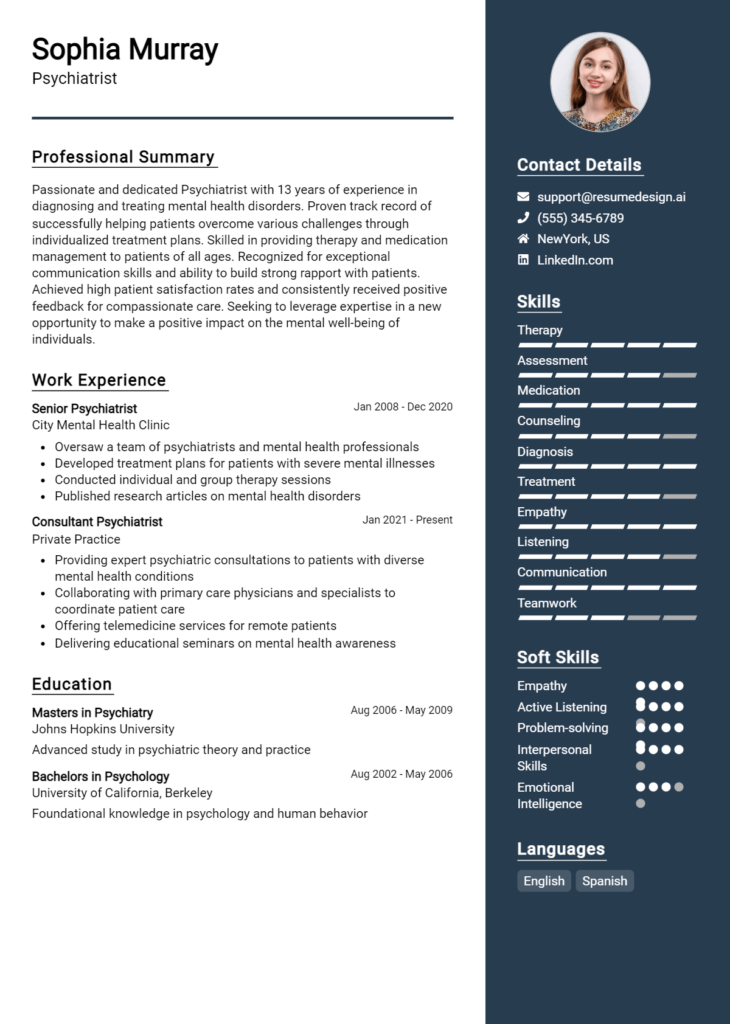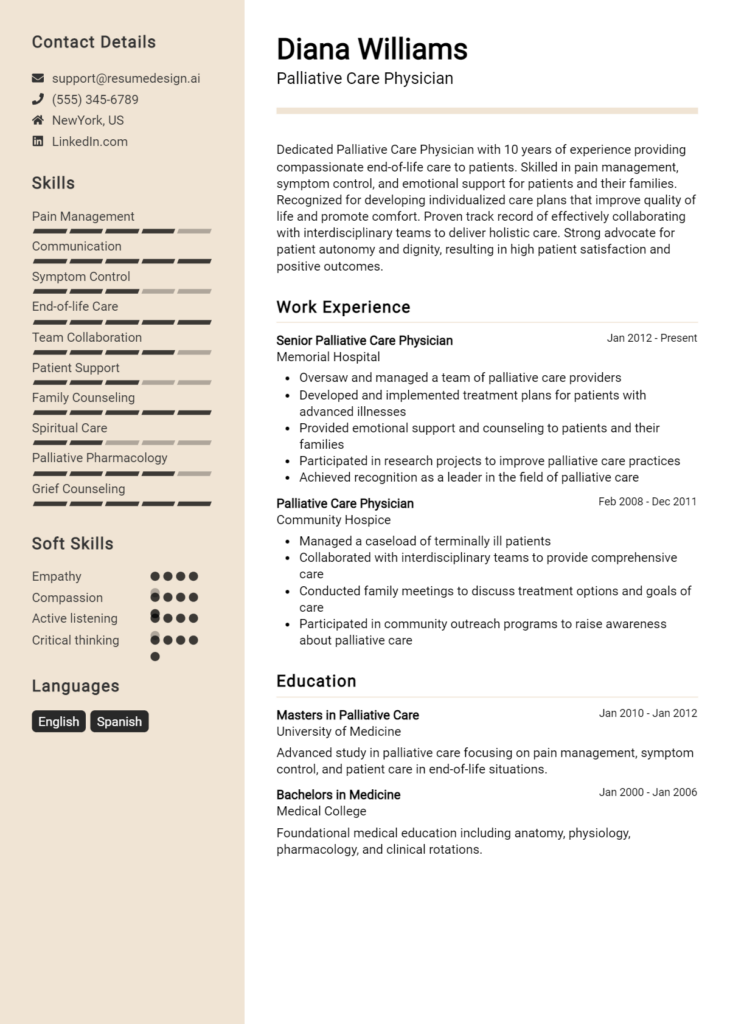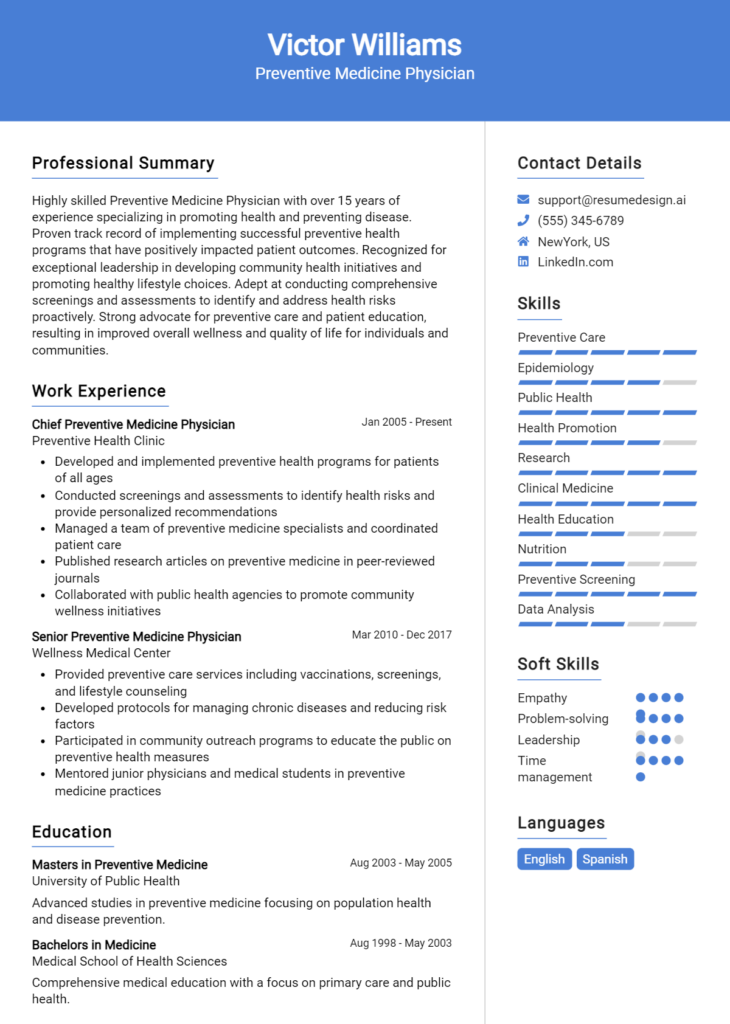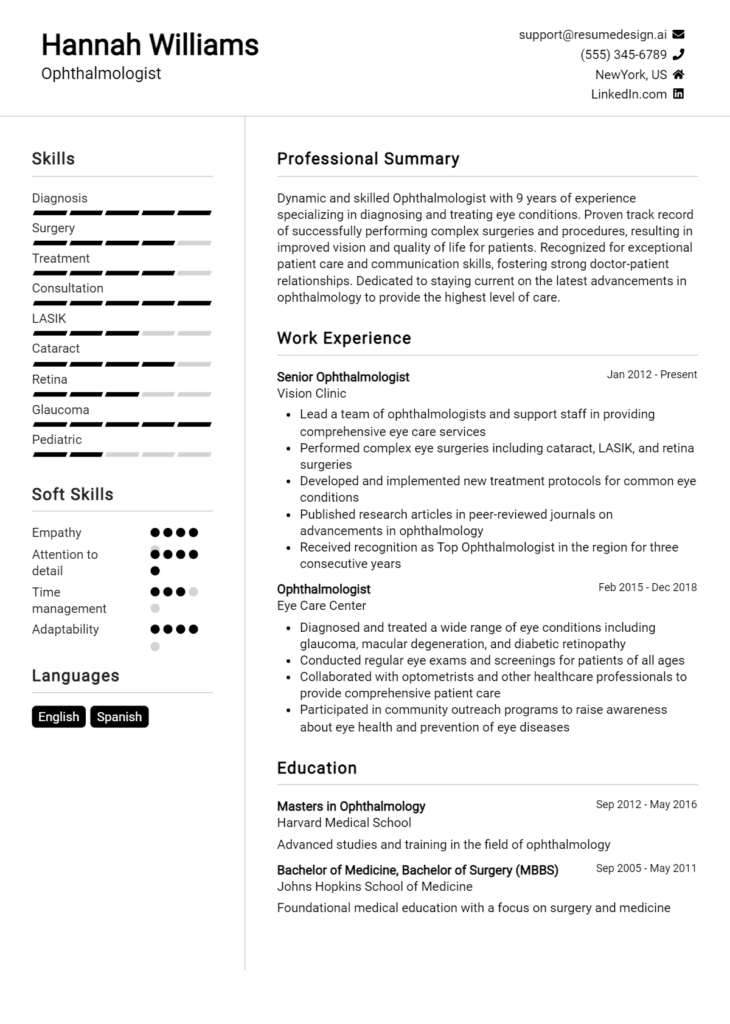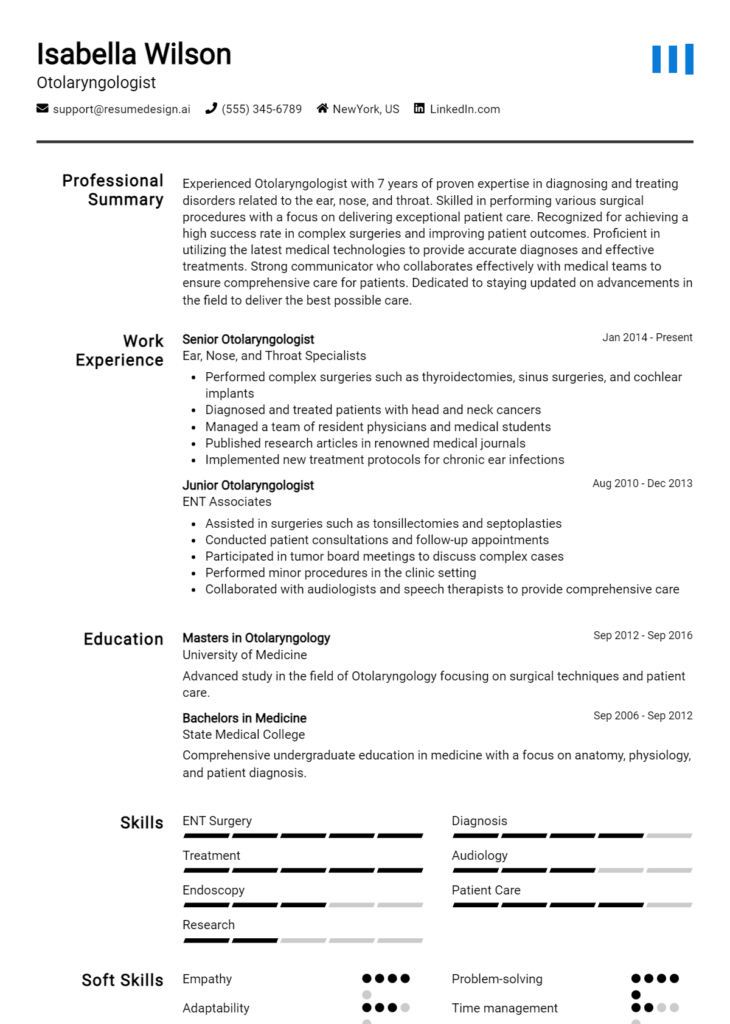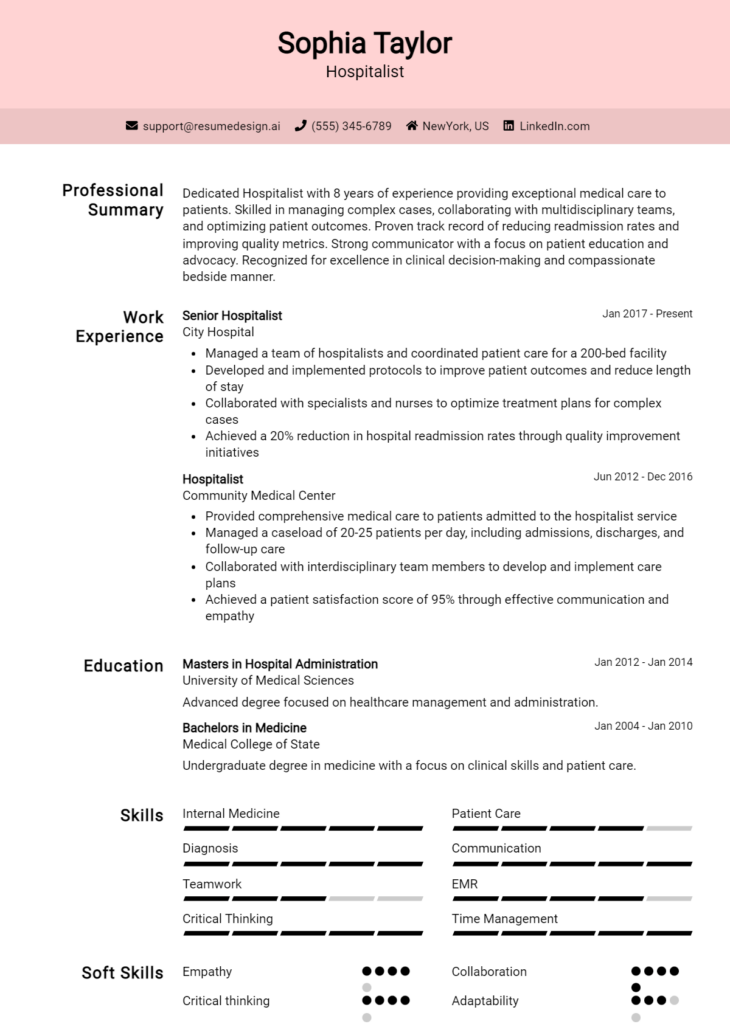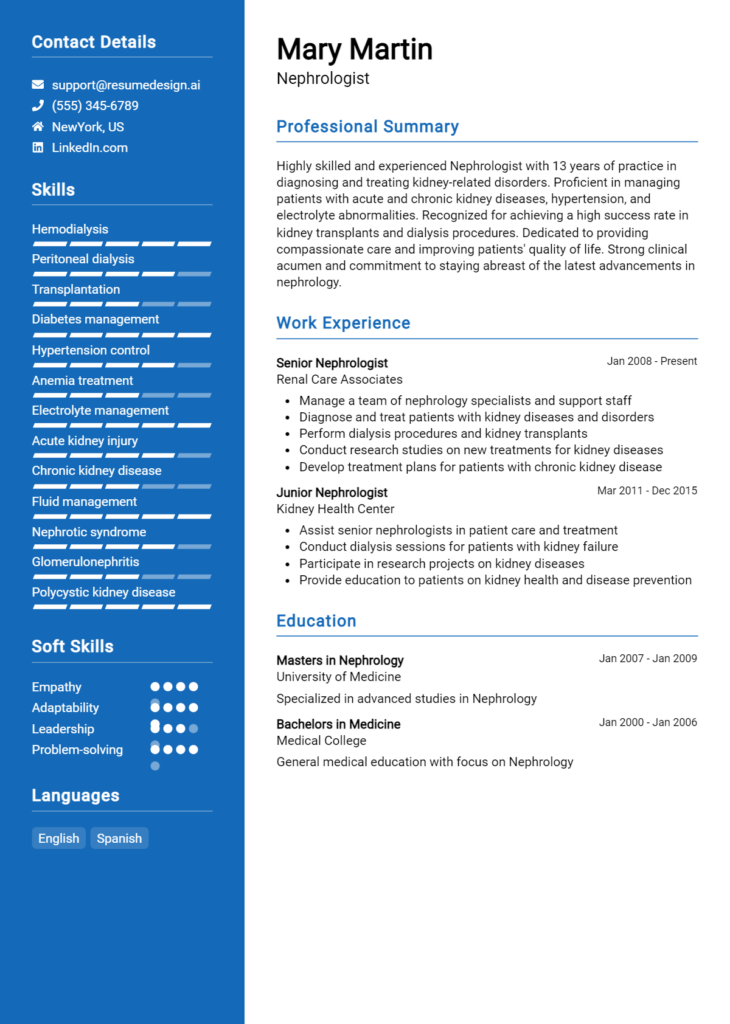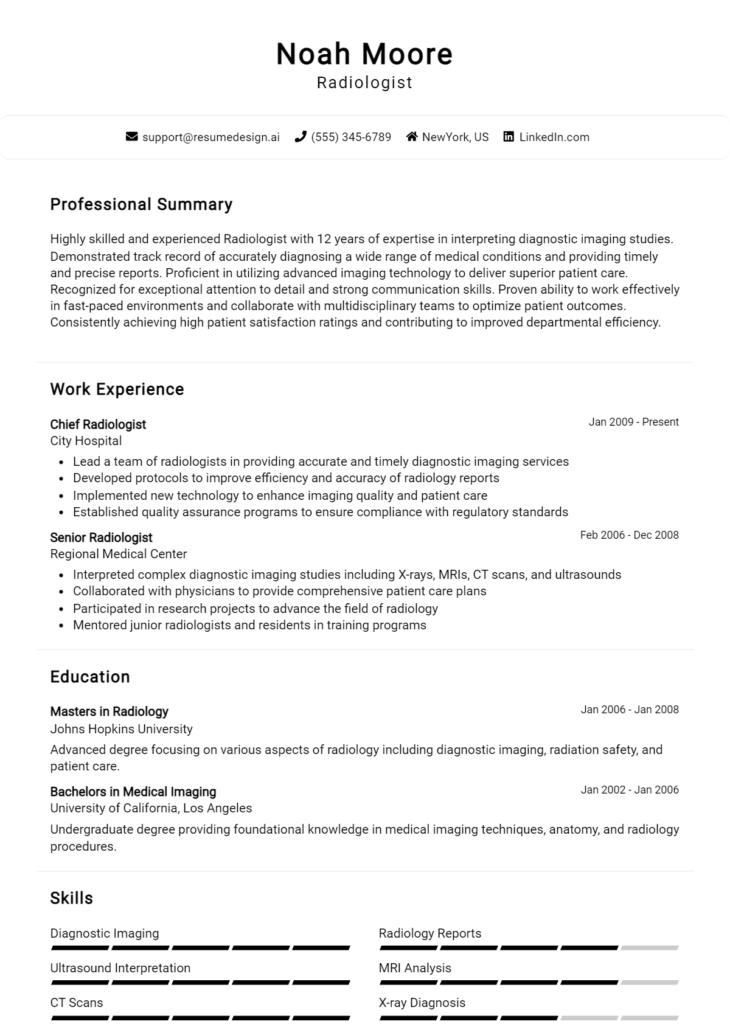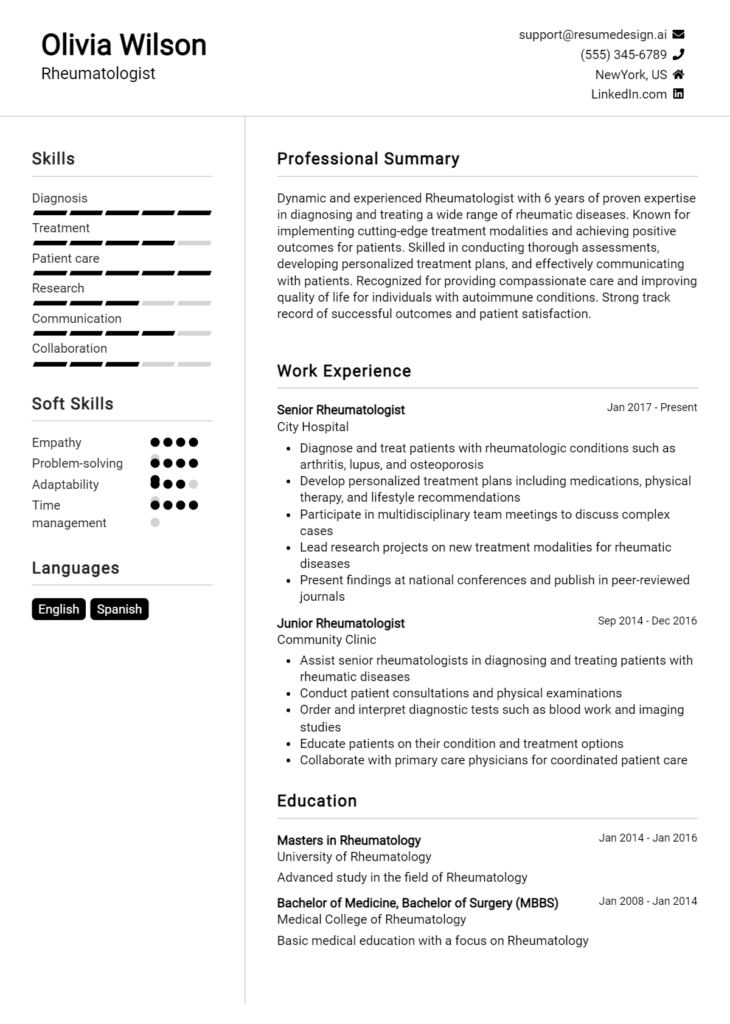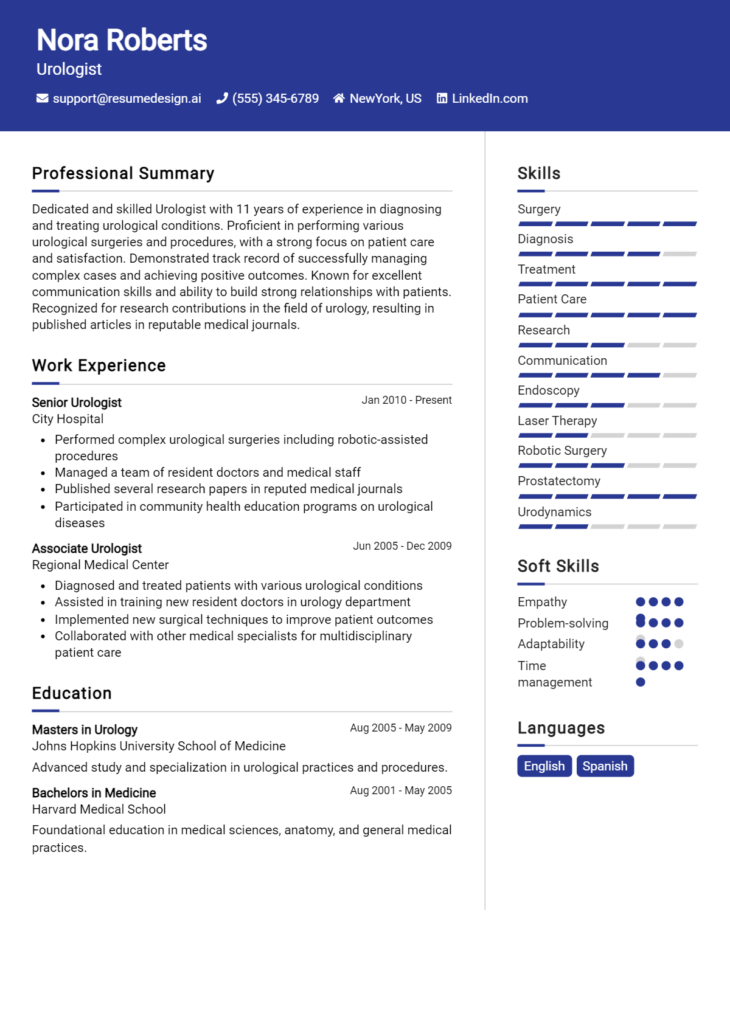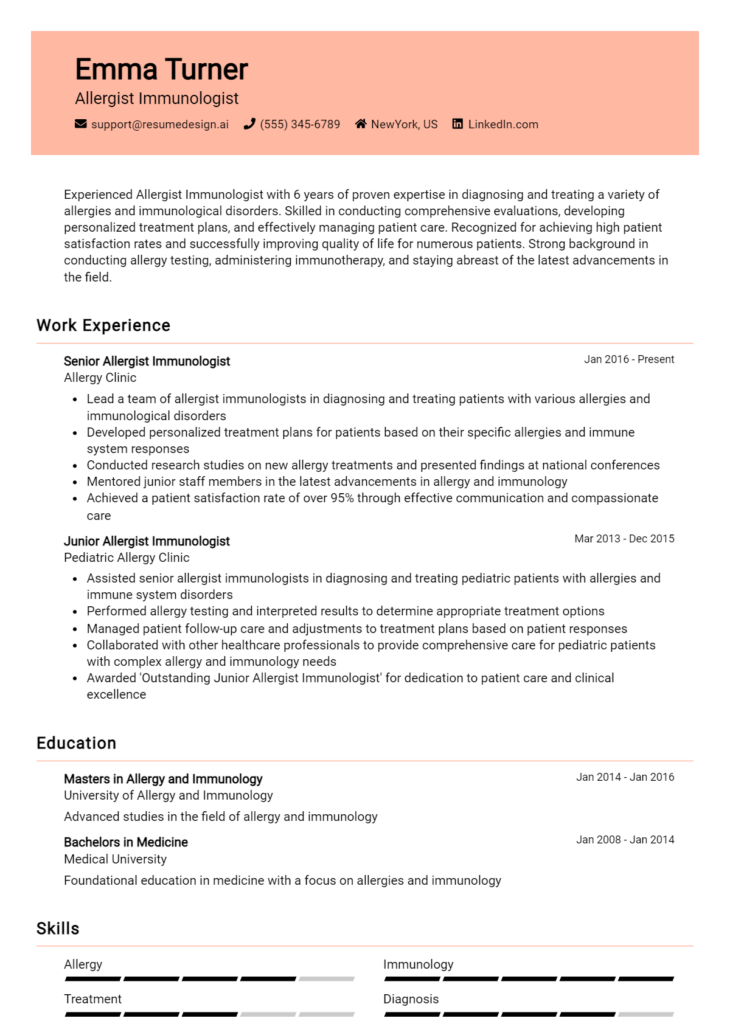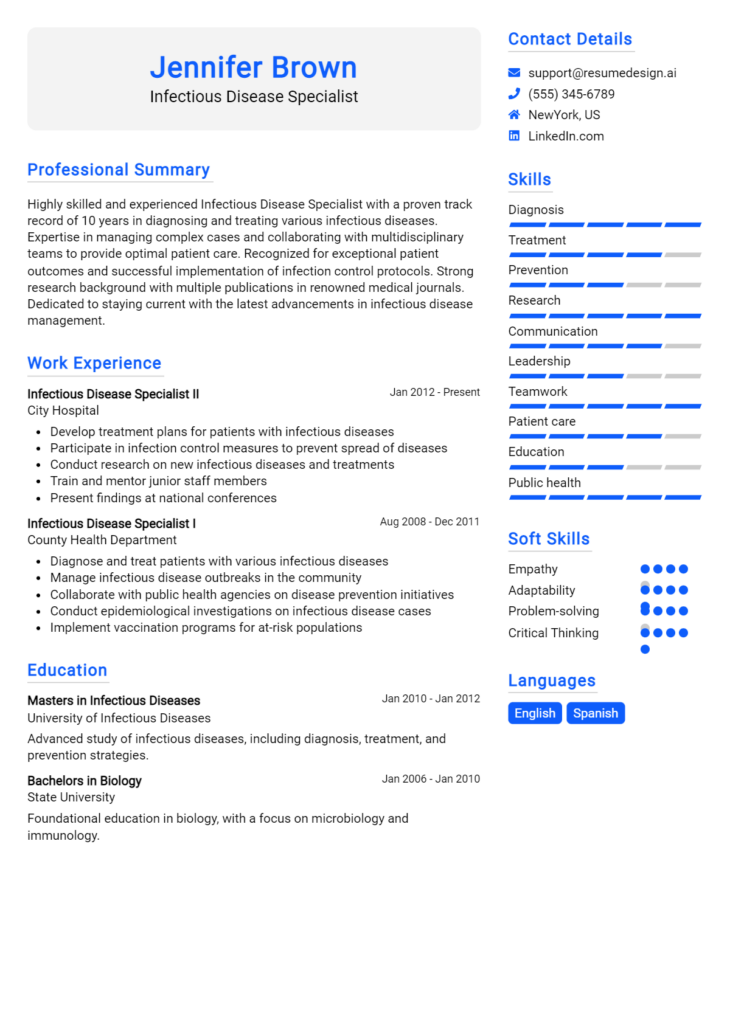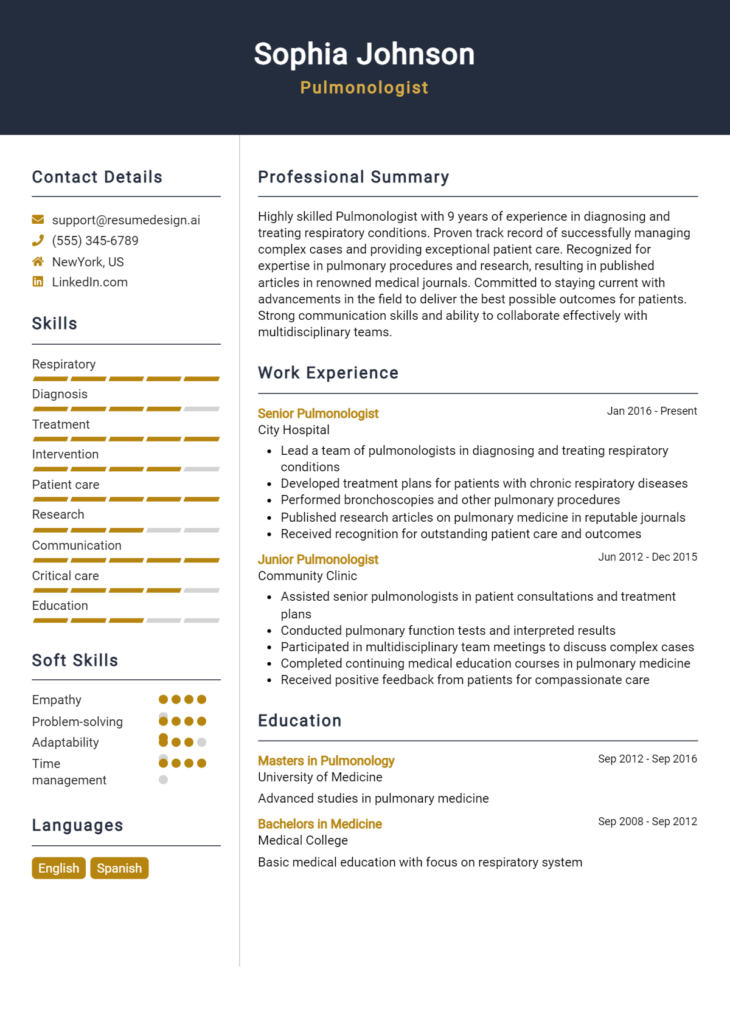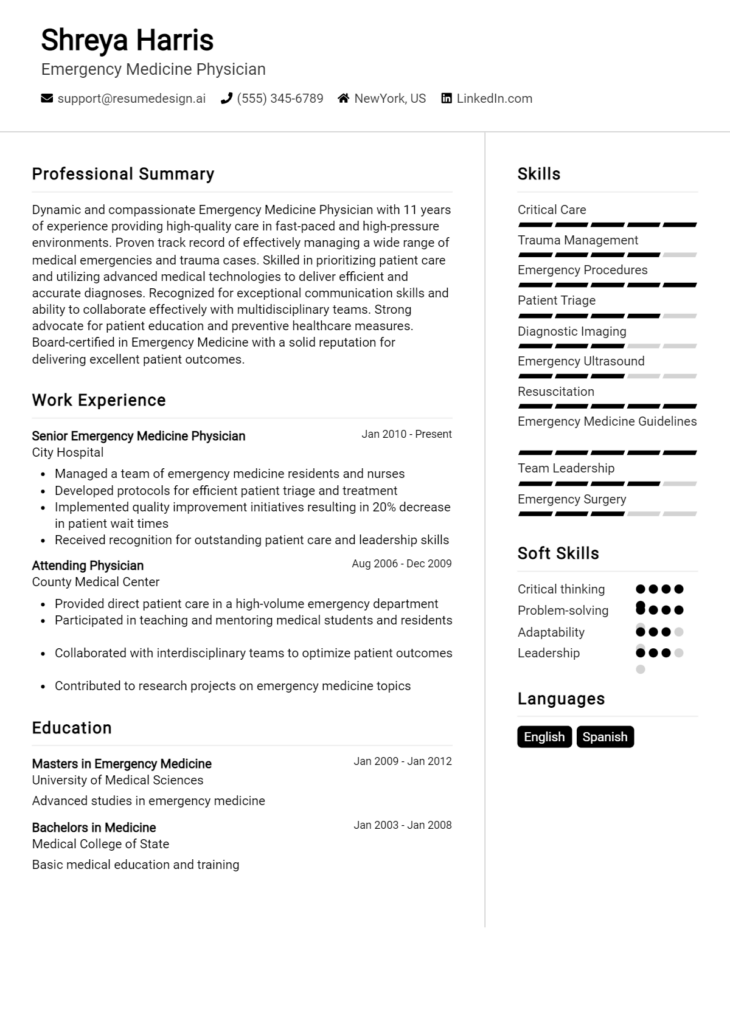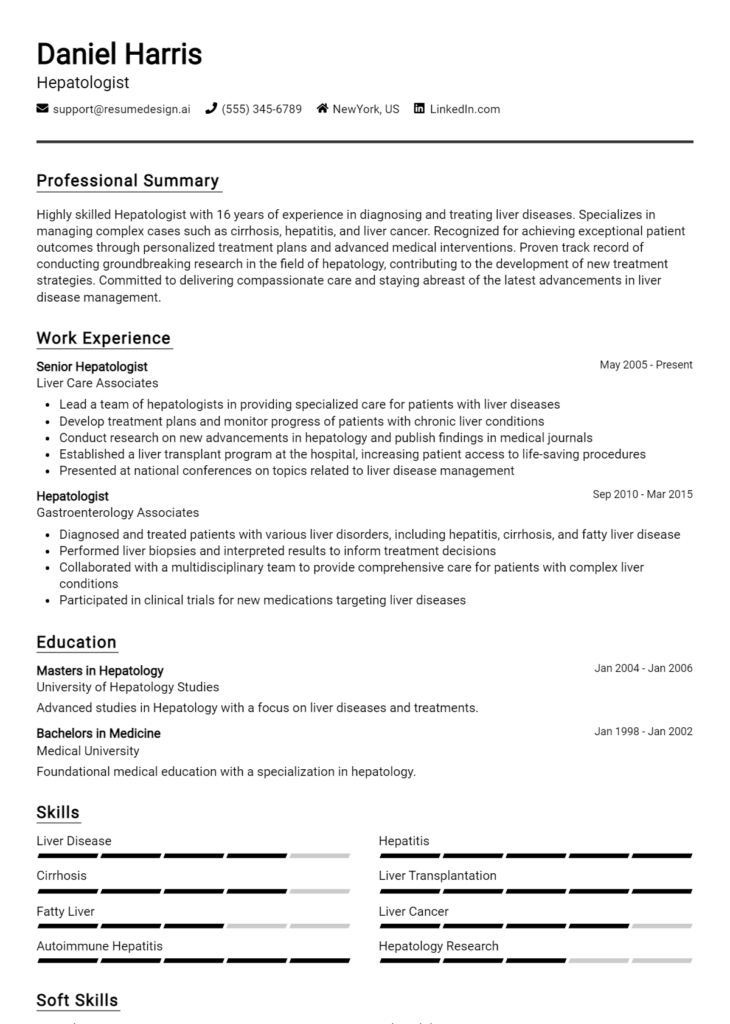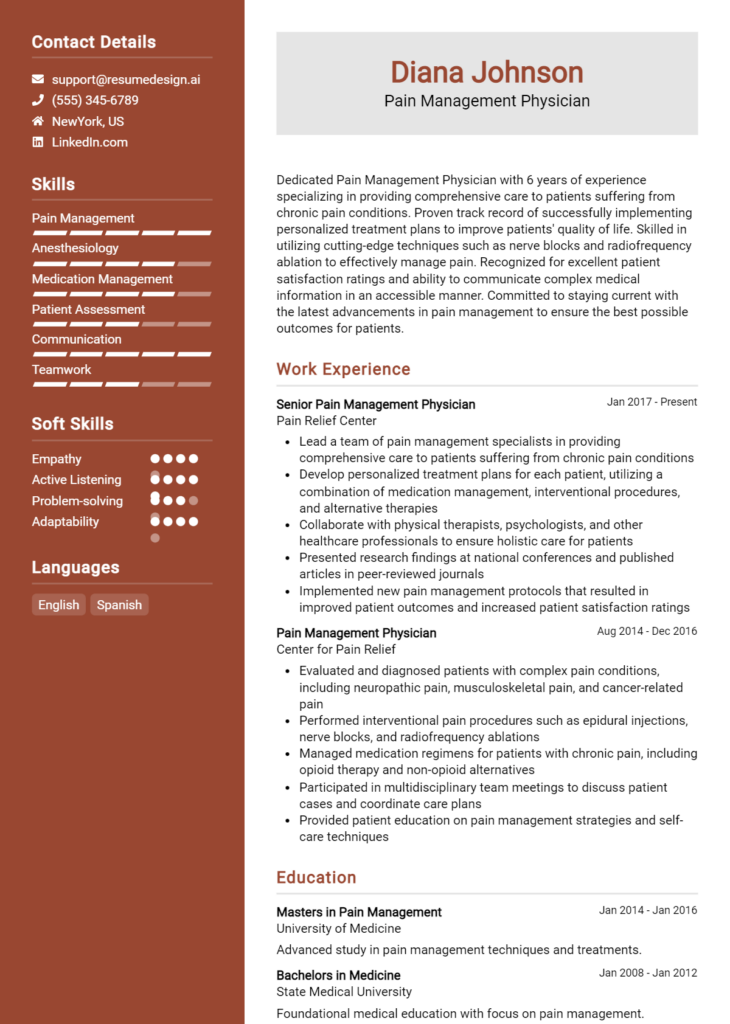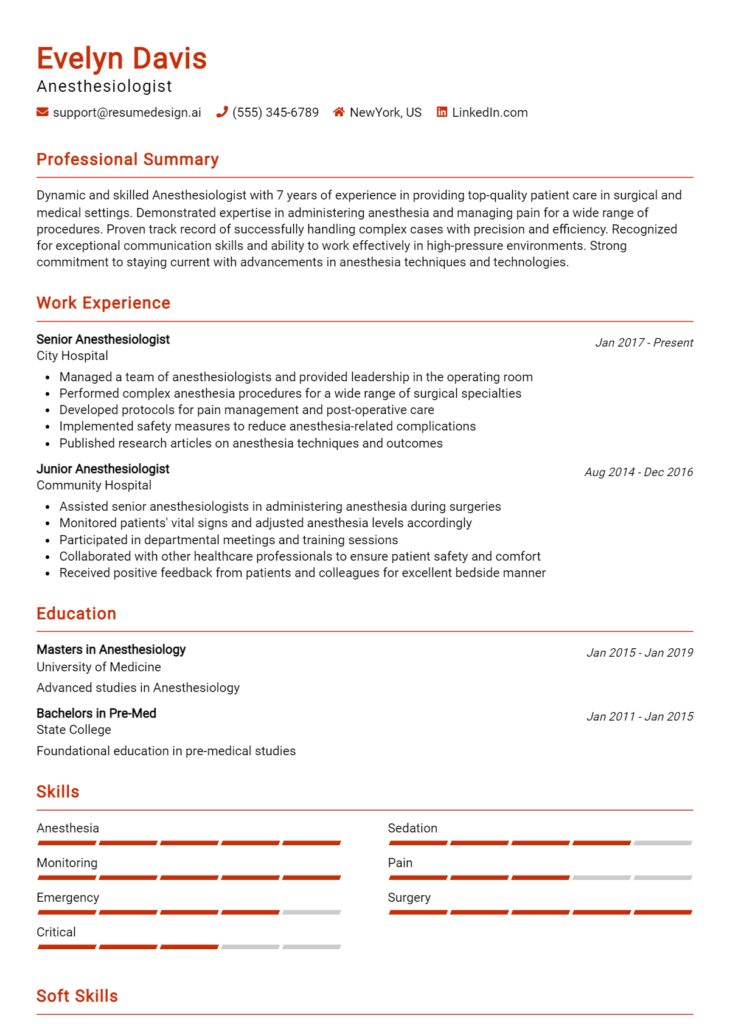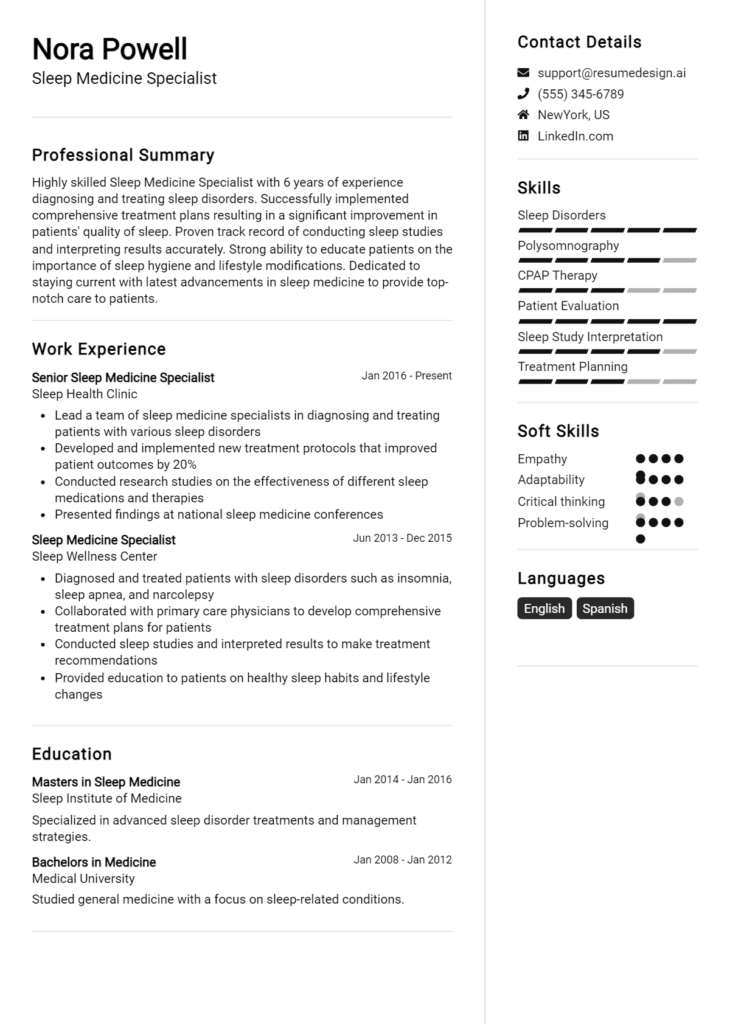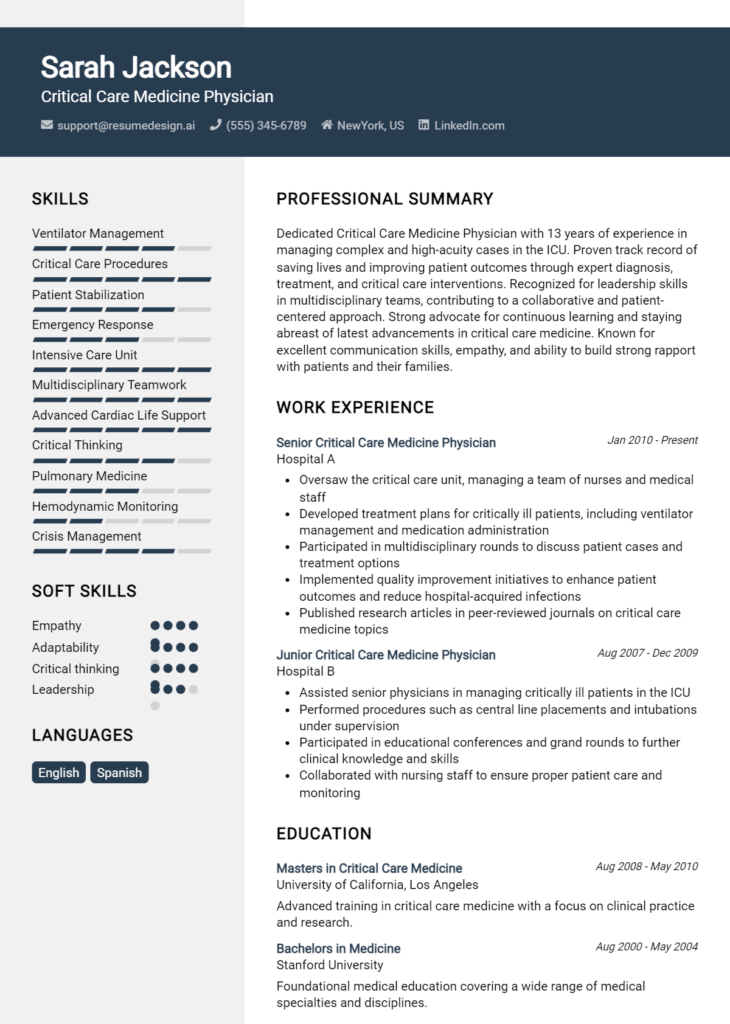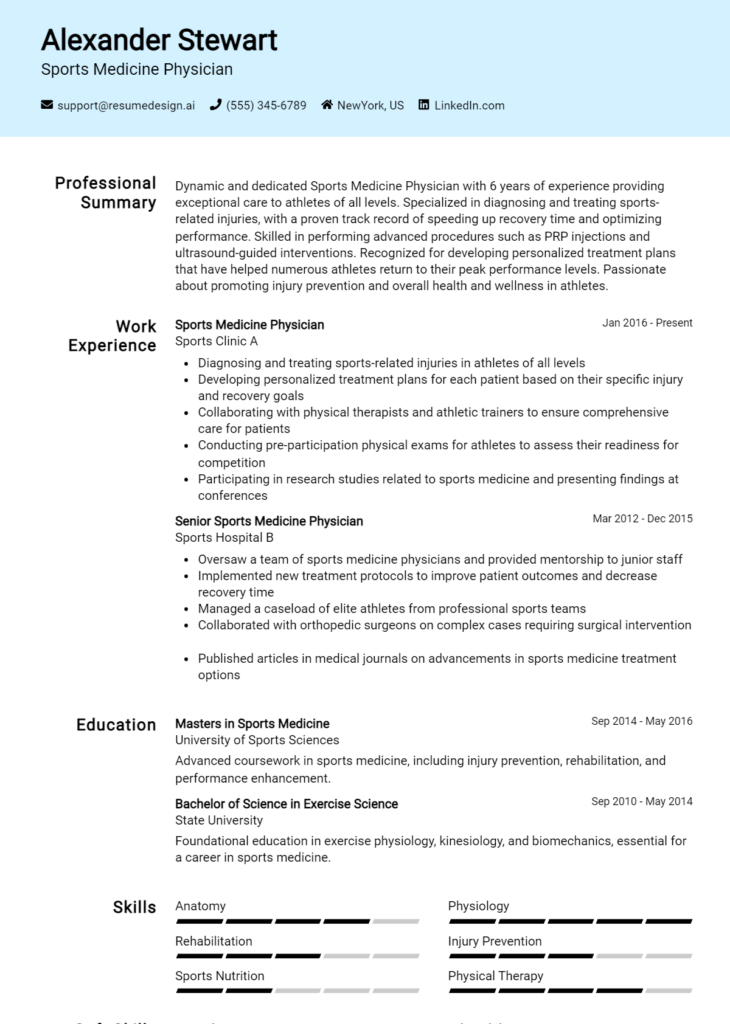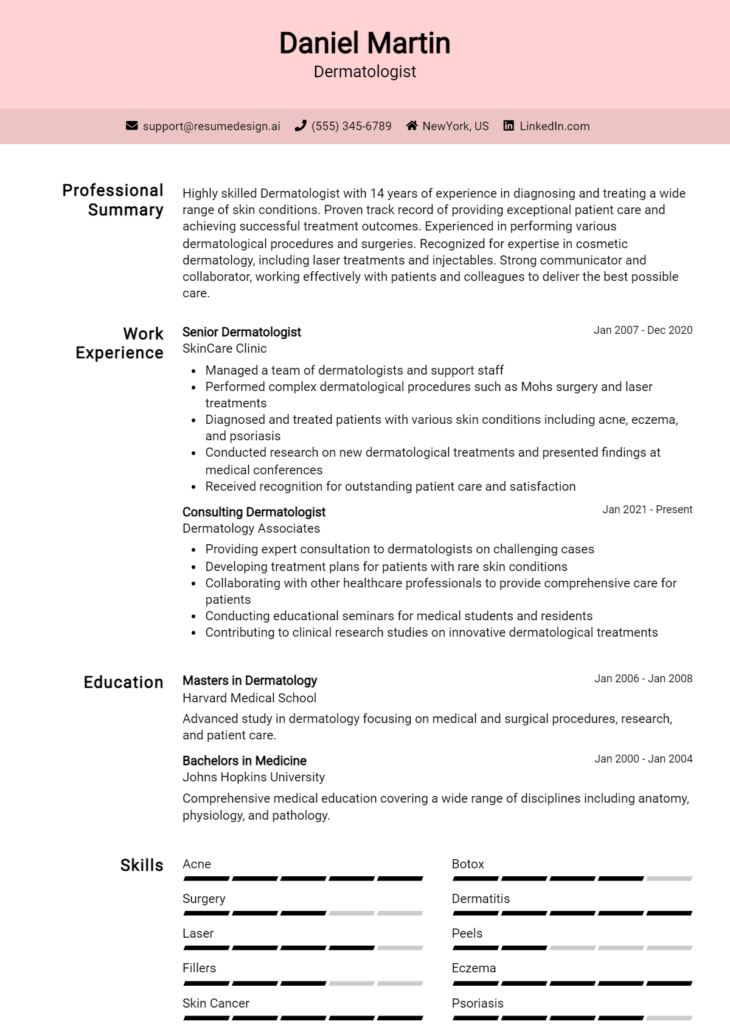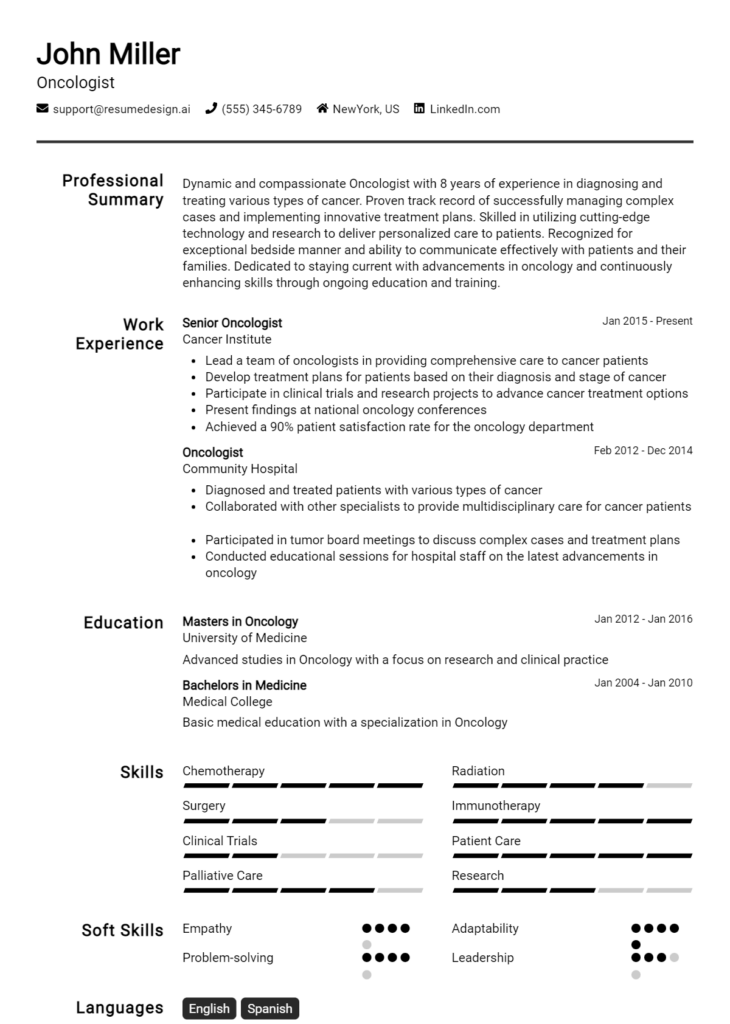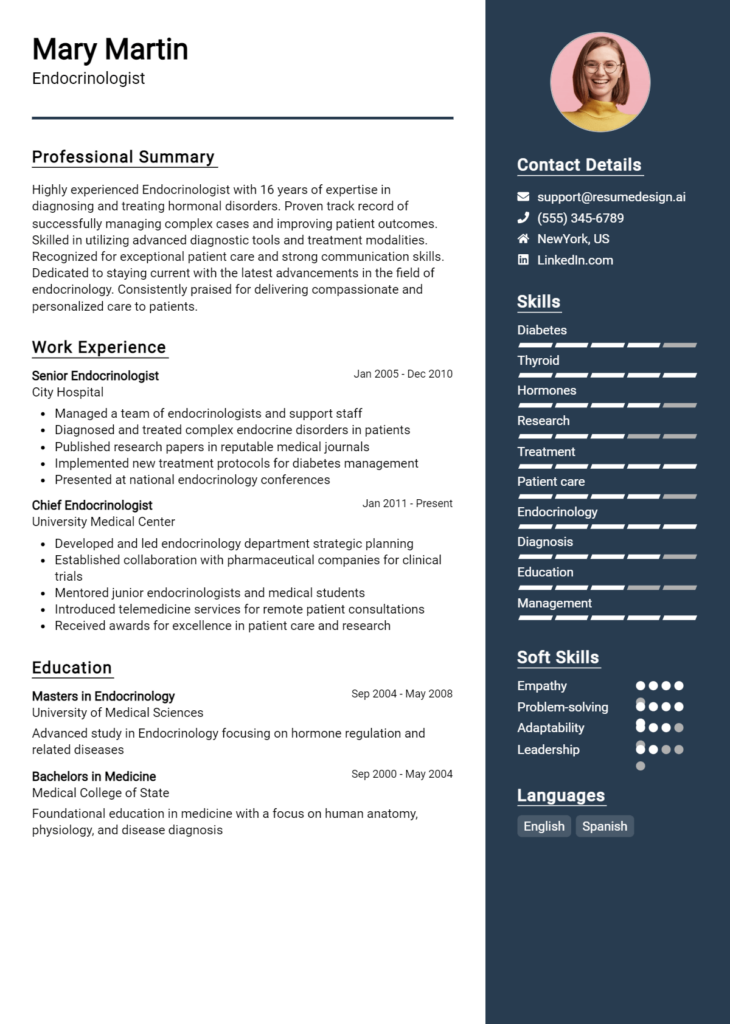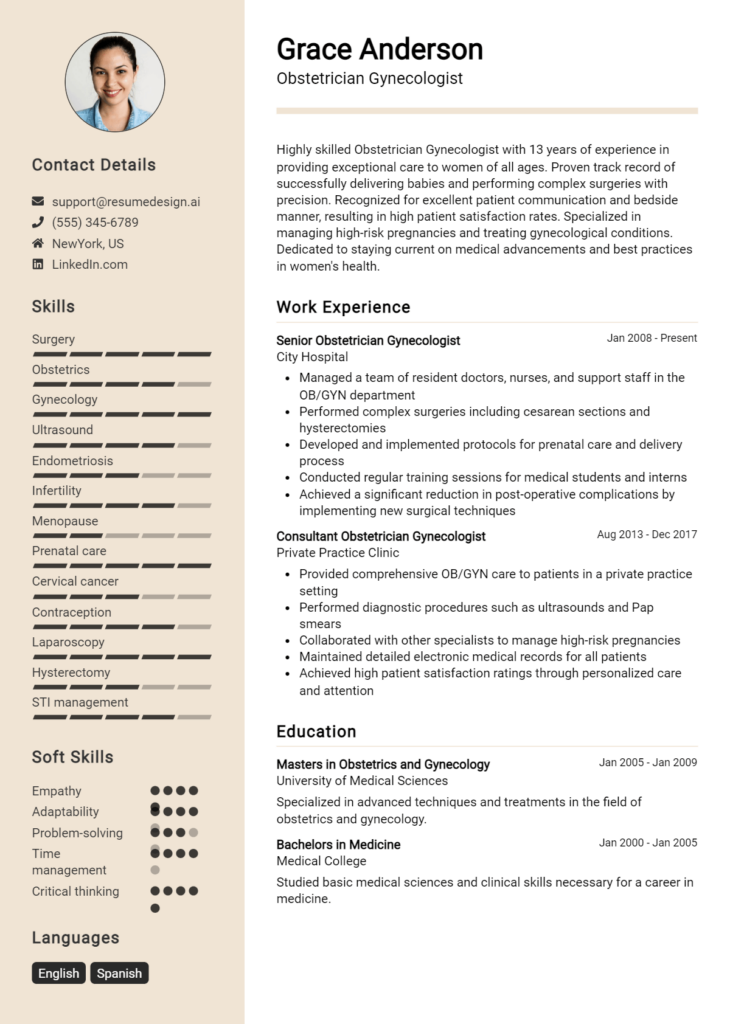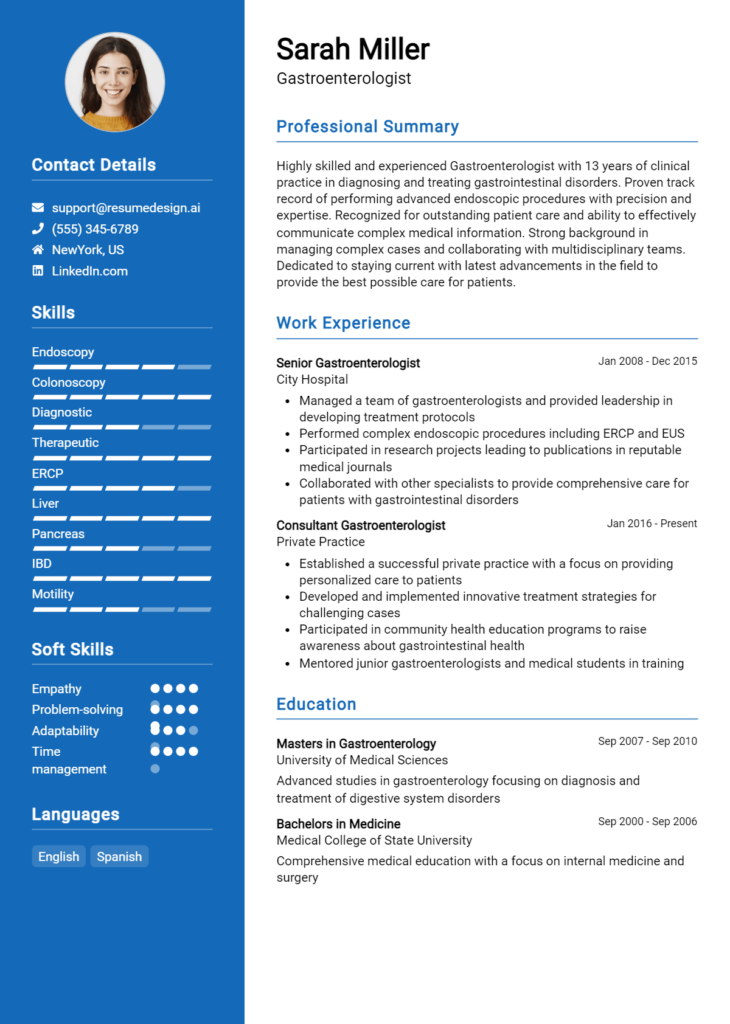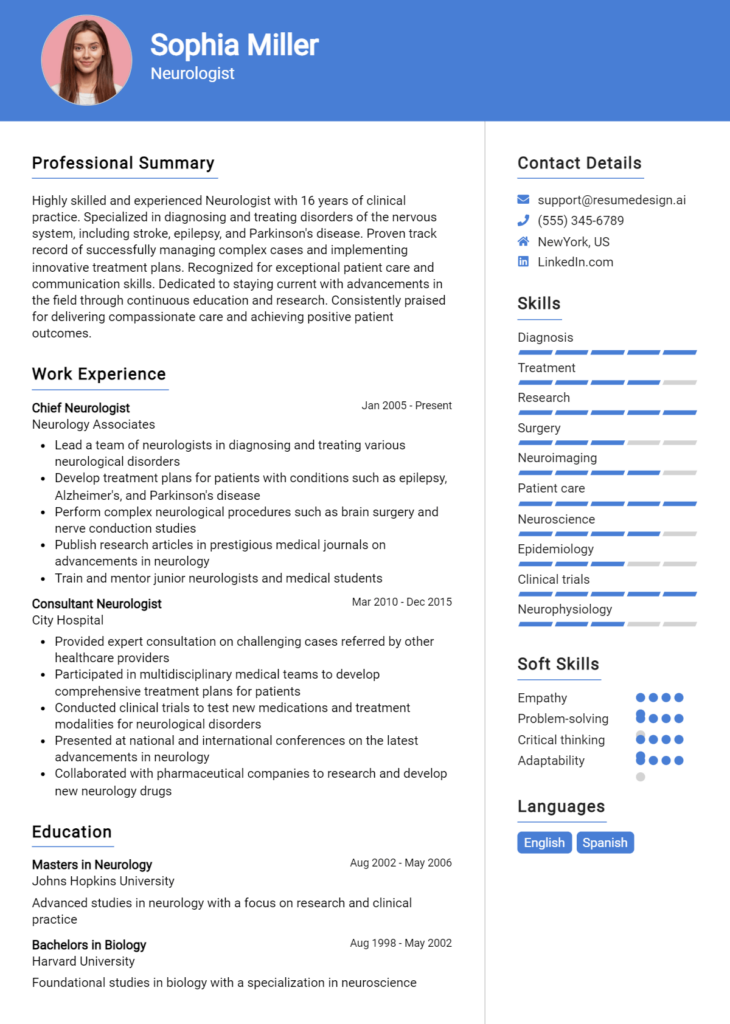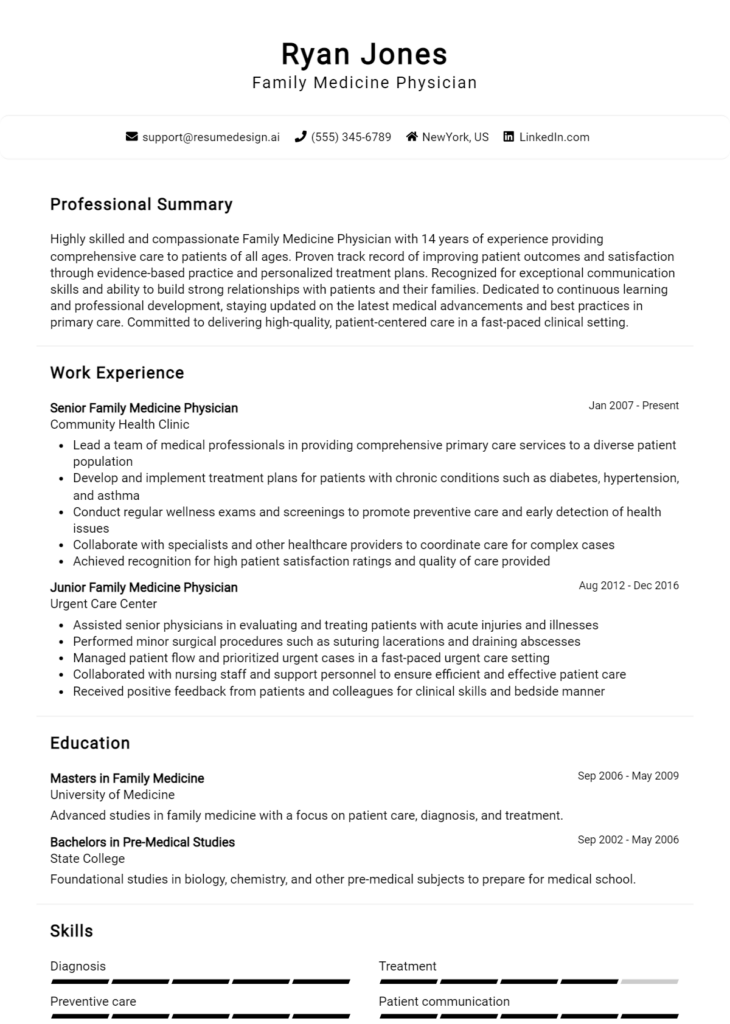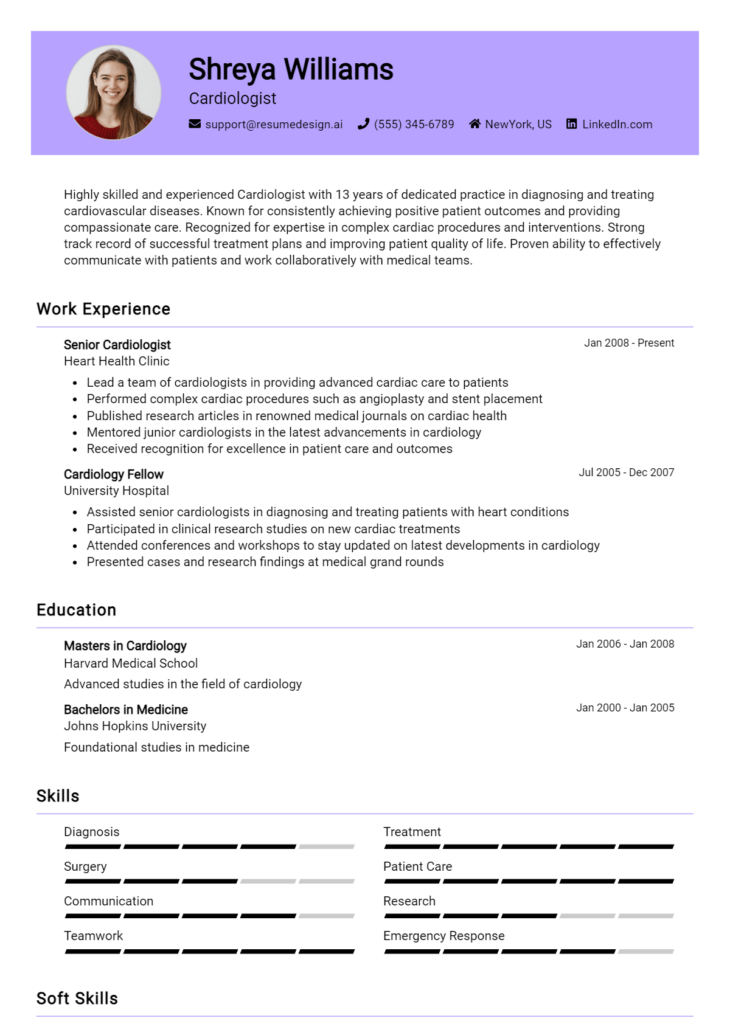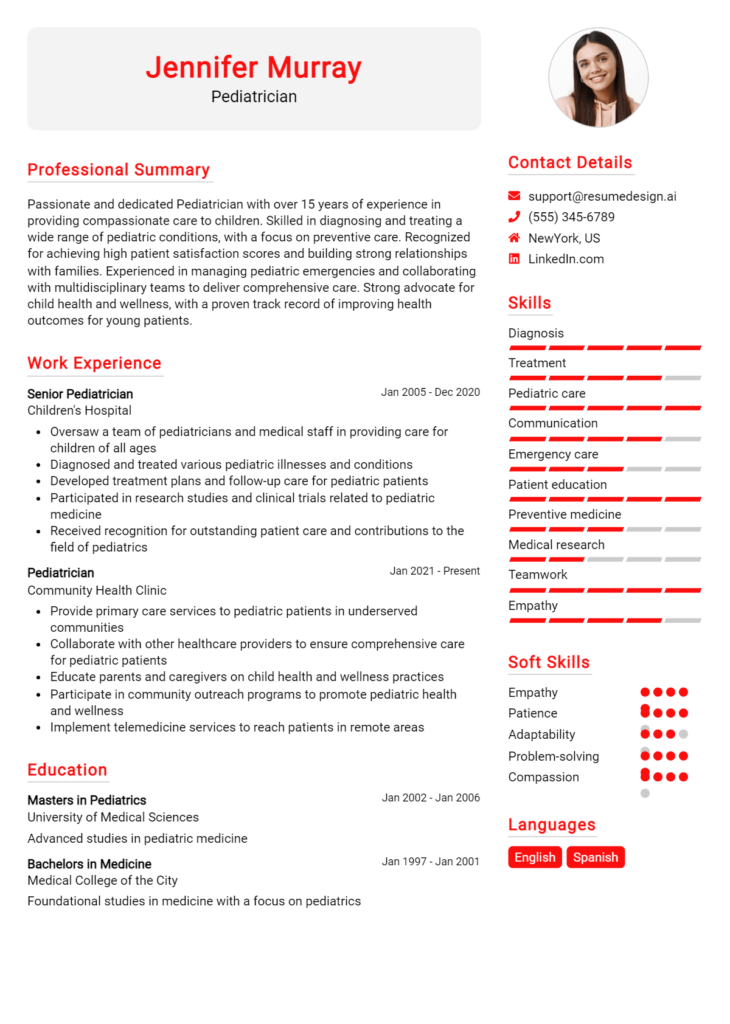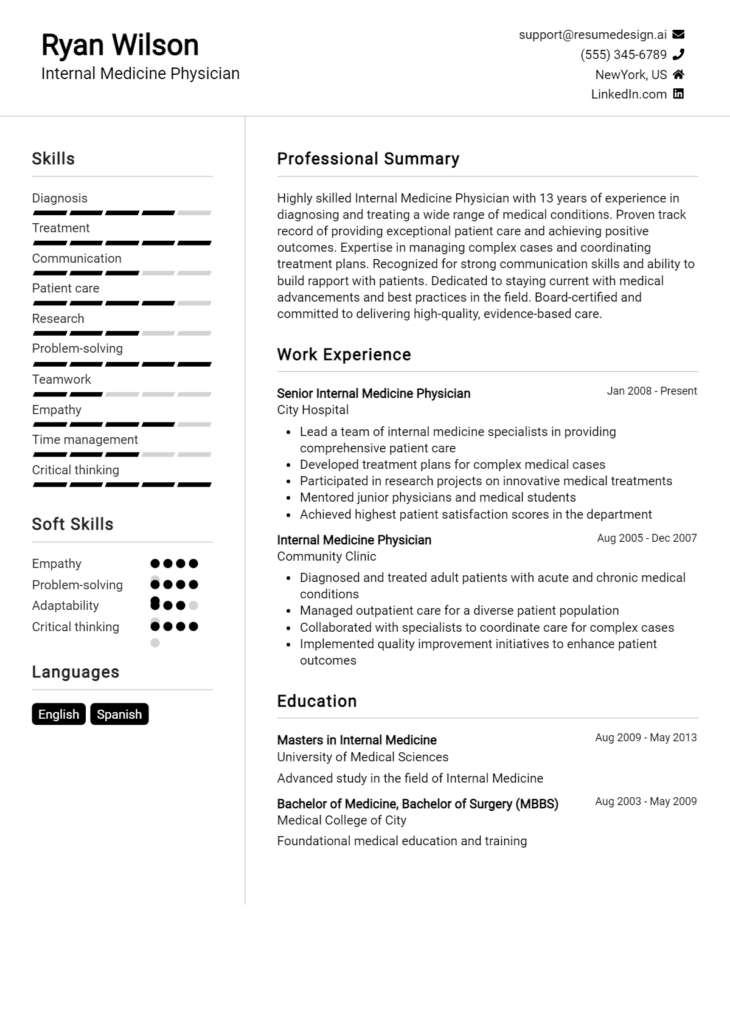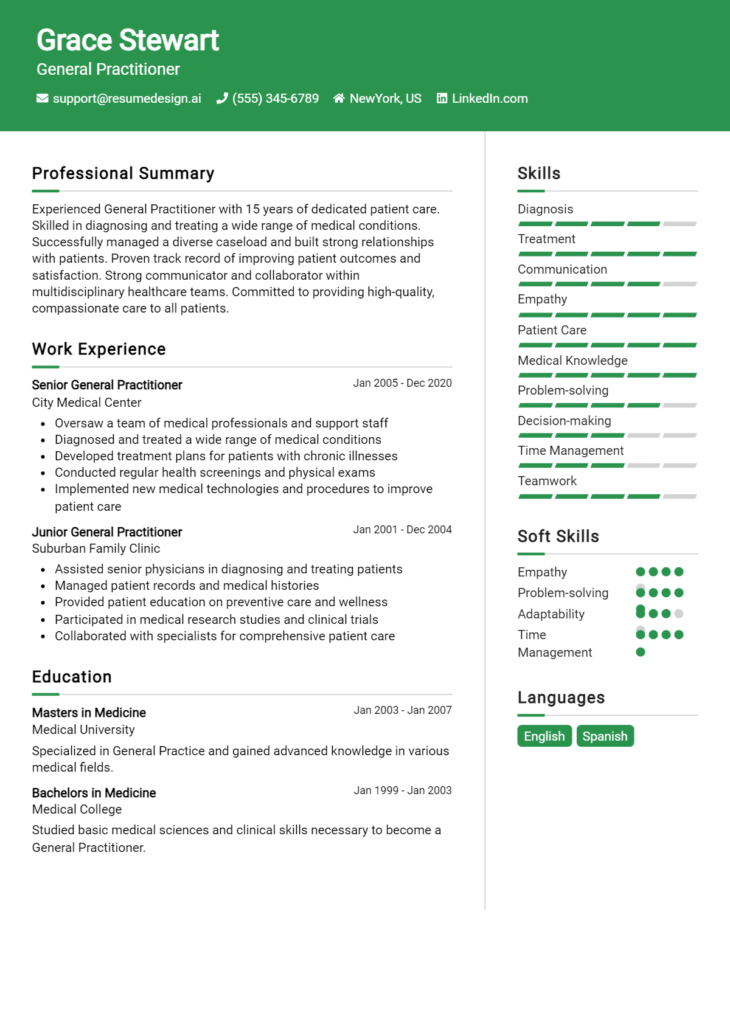Geriatrician Core Responsibilities
A Geriatrician specializes in the healthcare needs of older adults, focusing on comprehensive assessments and individualized care plans. Key responsibilities include diagnosing and managing age-related conditions, coordinating with multidisciplinary teams, and advocating for patients’ needs. Essential skills encompass strong technical knowledge, operational efficiency, and adept problem-solving abilities. These skills are vital in fostering collaboration across departments, ultimately enhancing patient outcomes and organizational goals. A well-structured resume effectively highlights these qualifications, showcasing a Geriatrician's impact on healthcare delivery.
Common Responsibilities Listed on Geriatrician Resume
- Conduct comprehensive geriatric assessments
- Develop and implement individualized care plans
- Manage chronic illnesses and comorbidities
- Coordinate care with other healthcare professionals
- Provide patient and family education on health management
- Monitor medication management and reduce polypharmacy
- Advocate for patients’ rights and needs
- Stay updated on geriatric research and best practices
- Participate in quality improvement initiatives
- Assist in end-of-life care planning
- Address mental health issues related to aging
High-Level Resume Tips for Geriatrician Professionals
In the competitive field of geriatrics, a well-crafted resume is crucial for making a strong first impression on potential employers. Your resume serves as your personal marketing tool, showcasing not only your clinical skills but also your achievements and passion for providing exceptional care to elderly patients. Given the unique demands of this specialty, it’s essential that your resume reflects an understanding of geriatric medicine, emphasizing relevant experience and qualifications. This guide aims to provide practical and actionable resume tips specifically tailored for Geriatrician professionals, helping you to present your best self to future employers.
Top Resume Tips for Geriatrician Professionals
- Tailor your resume to each job description by highlighting the experiences and skills that align with the specific requirements of the position.
- Showcase relevant experience, including clinical rotations, fellowships, and internships that specifically relate to geriatric care.
- Quantify your achievements by including metrics, such as the number of patients managed or improvements in patient outcomes, to illustrate your impact.
- Highlight industry-specific skills, such as knowledge of geriatric pharmacology, management of chronic conditions, and understanding of age-related psychological issues.
- Incorporate keywords from the job posting to ensure your resume passes through Applicant Tracking Systems (ATS) and reaches hiring managers.
- Include professional development activities, such as conferences, workshops, or additional certifications relevant to geriatrics, to demonstrate your commitment to the field.
- Keep your resume concise, ideally one to two pages, focusing on the most impactful information that aligns with the job you are applying for.
- Use a clean, professional format with clear headings and bullet points to enhance readability and present your information in an organized manner.
- Consider adding a brief personal statement or objective at the top of your resume to convey your passion for geriatrics and your career goals.
By implementing these tips, you can significantly enhance your chances of landing a job in the Geriatrician field. A polished resume that effectively showcases your qualifications and dedication to elderly care will capture the attention of hiring managers, setting you on the path to a successful career in this vital specialty.
Why Resume Headlines & Titles are Important for Geriatrician
In the competitive field of geriatric medicine, a well-crafted resume headline or title is crucial for a Geriatrician. This succinct phrase serves as the first impression for hiring managers, encapsulating key qualifications and expertise in a format that demands attention. A strong headline can effectively summarize a candidate's experience and skills, positioning them as a top contender for the role. It should be concise, relevant, and tailored to the specific job being applied for, ensuring that it resonates with the employer's needs and expectations.
Best Practices for Crafting Resume Headlines for Geriatrician
- Keep it concise: Aim for one impactful phrase that summarizes your expertise.
- Be role-specific: Tailor your headline to reflect the specific requirements of the Geriatrician role.
- Highlight key strengths: Include notable skills, certifications, or experiences that set you apart.
- Use impactful language: Choose strong, active words that convey confidence and competence.
- Avoid jargon: Use clear language that is easily understood by all hiring managers.
- Reflect your career goals: Ensure your headline aligns with your aspirations in geriatric medicine.
- Include relevant qualifications: Mention any specialized training or credentials pertinent to geriatrics.
- Stay professional: Maintain a formal tone that reflects the seriousness of the medical profession.
Example Resume Headlines for Geriatrician
Strong Resume Headlines
Compassionate Geriatrician with 10+ Years of Experience in Patient-Centered Care
Board-Certified Geriatrician Specializing in Dementia and Alzheimer’s Care
Dedicated Geriatric Specialist Committed to Enhancing Quality of Life for Seniors
Weak Resume Headlines
Doctor Looking for a Job
Experienced Healthcare Professional
Strong headlines are effective because they provide a clear and immediate sense of the candidate's qualifications and focus in the field of geriatrics, capturing the essence of their professional identity. They are direct, specific, and compelling, making it easier for hiring managers to see the candidate's value at a glance. In contrast, weak headlines fail to impress due to their vagueness and lack of specificity, leaving hiring managers with no clear indication of the candidate's expertise or suitability for the role. This can lead to missed opportunities in a highly specialized field where clarity and focus are paramount.
Writing an Exceptional Geriatrician Resume Summary
A well-crafted resume summary is essential for a Geriatrician, as it serves as the first impression to hiring managers. This concise paragraph quickly captures attention by highlighting key skills, relevant experience, and notable accomplishments tailored to the specific role. An impactful summary not only summarizes qualifications but also sets the tone for the rest of the resume, making it crucial for candidates to convey their expertise effectively and succinctly.
Best Practices for Writing a Geriatrician Resume Summary
- Quantify achievements: Use numbers to illustrate your impact, such as patient outcomes or the number of patients treated.
- Focus on skills: Highlight both clinical and interpersonal skills that are vital for working with elderly patients.
- Tailor for the job description: Customize your summary to reflect the specific requirements and preferences of the position you are applying for.
- Keep it concise: Aim for 2-4 sentences that deliver maximum information in a limited space.
- Use strong action verbs: Start sentences with dynamic verbs to create a sense of action and engagement.
- Showcase relevant experience: Highlight specialized training or past roles that align with geriatric care.
- Include soft skills: Emphasize qualities like empathy, patience, and communication, which are crucial when working with older adults.
- Avoid jargon: Use clear and accessible language to ensure your summary is understandable to all readers.
Example Geriatrician Resume Summaries
Strong Resume Summaries
Compassionate Geriatrician with over 10 years of experience improving quality of life for elderly patients through personalized care plans and interdisciplinary collaboration. Successfully reduced hospital readmission rates by 30% in the past year through proactive patient management and education.
Dedicated Geriatrician with extensive expertise in managing chronic illnesses in older adults, having treated over 1,500 patients with complex health issues. Recognized for implementing a geriatric assessment program that increased patient satisfaction scores by 25%.
Board-certified Geriatrician specializing in dementia care with a proven track record of enhancing cognitive function and social engagement among patients. Developed and led community outreach programs that educated families on Alzheimer’s disease, reaching over 200 participants in the last year.
Weak Resume Summaries
Experienced doctor with a focus on older patients. I have worked in various healthcare settings.
Geriatrician with skills in patient care and management. I enjoy helping elderly patients live better lives.
The examples of strong resume summaries are considered effective because they provide specific achievements, quantify results, and clearly articulate relevant skills directly applicable to the role of a Geriatrician. In contrast, the weak resume summaries lack detail, do not highlight quantifiable outcomes or specific skills, and come across as generic and uninspired, which may fail to capture the attention of hiring managers.
Work Experience Section for Geriatrician Resume
The work experience section of a Geriatrician resume is a critical component that allows candidates to demonstrate their specialized skills and competencies in the field of geriatric medicine. This section not only highlights the technical abilities required for diagnosing and treating older adults but also showcases the candidate's capability to lead teams, coordinate care, and ensure the delivery of high-quality healthcare services. By quantifying achievements and aligning their experiences with industry standards, candidates can effectively illustrate their impact and value within the healthcare system, making a compelling case for their candidacy.
Best Practices for Geriatrician Work Experience
- Highlight relevant certifications and specialized training in geriatric medicine.
- Use metrics and data to quantify patient outcomes and improvements.
- Emphasize collaboration with multidisciplinary teams to enhance patient care.
- Detail experience with evidence-based practices and guidelines in geriatric care.
- Showcase leadership roles in clinical settings or community health initiatives.
- Include participation in research or quality improvement projects.
- Demonstrate effective communication skills with patients and families.
- Tailor experiences to align with the specific job description and requirements.
Example Work Experiences for Geriatrician
Strong Experiences
- Led a multidisciplinary team in managing care for over 200 elderly patients, resulting in a 30% reduction in hospital readmissions over two years.
- Implemented a new patient assessment protocol that improved diagnostic accuracy by 25% and increased patient satisfaction scores by 15%.
- Conducted research on the effects of polypharmacy in older adults, leading to the publication of findings in a peer-reviewed journal, which contributed to revised prescribing guidelines.
- Trained and supervised a team of five junior doctors, enhancing their skills in geriatric assessment and management, leading to improved team efficiency and patient outcomes.
Weak Experiences
- Worked with elderly patients in various settings.
- Helped manage patient care without specific details on outcomes or processes.
- Participated in meetings related to geriatric care.
- Had some involvement in patient assessments.
The examples of strong experiences are considered effective because they provide specific, quantifiable outcomes that demonstrate the candidate's technical expertise and leadership capabilities in geriatric medicine. They highlight measurable improvements in patient care and the candidate's active role in research and team management. Conversely, the weak experiences lack detail and specificity, making it difficult to assess the candidate's impact or contributions, which diminishes their effectiveness in showcasing relevant skills and achievements.
Education and Certifications Section for Geriatrician Resume
The education and certifications section of a Geriatrician resume is crucial in establishing the candidate's qualifications and expertise in providing specialized care for older adults. This section showcases the academic foundation, relevant certifications, and ongoing commitment to professional development, all of which are essential in a field that requires both extensive knowledge and practical skills. By detailing relevant coursework, specialized training, and recognized credentials, candidates can enhance their credibility and demonstrate their alignment with the demands of the geriatric care role, making them more appealing to potential employers.
Best Practices for Geriatrician Education and Certifications
- List your highest degree first, including the institution and graduation date.
- Highlight any specialized training or fellowships in geriatrics or geriatric medicine.
- Include industry-recognized certifications, such as Board Certification in Geriatric Medicine.
- Detail relevant coursework that directly pertains to geriatric patient care and management.
- Update the section regularly to reflect any new certifications or continued education.
- Use clear and concise language, avoiding jargon that may not be widely understood.
- Be specific about the skills acquired through training and education that are applicable to geriatrics.
- Include memberships in professional organizations related to geriatrics to signify commitment to the field.
Example Education and Certifications for Geriatrician
Strong Examples
- Doctor of Medicine (MD), University of Medical Sciences, 2015
- Board Certified in Geriatric Medicine, American Board of Medical Specialties, 2018
- Fellowship in Geriatric Medicine, National Institute of Aging, 2016-2017
- Relevant Coursework: Advanced Geriatric Patient Care, Pharmacology in Older Adults, and Dementia Care Strategies.
Weak Examples
- Bachelor of Arts in Psychology, University of Arts, 2010 (not directly related to geriatrics)
- Certification in Basic Life Support (BLS) from 2010 (outdated for advanced practice)
- High School Diploma, Local High School, 2006 (not relevant for a professional role)
- Online Course: Introduction to Geriatrics, 2019 (not accredited or recognized)
The strong examples listed above are considered robust because they demonstrate relevant degrees and certifications directly applicable to the role of a Geriatrician, showcasing an advanced understanding of geriatric care. In contrast, the weak examples lack relevance and do not reflect the specialized knowledge or skills required for effective practice in geriatrics, making them less impactful on a resume.
Top Skills & Keywords for Geriatrician Resume
As a Geriatrician, possessing the right skill set is crucial not only for effective patient care but also for enhancing your resume. The healthcare landscape is constantly evolving, and a well-rounded Geriatrician must demonstrate both soft and hard skills tailored to the unique needs of older adults. Highlighting these skills on your resume can set you apart from other candidates and reflect your ability to provide comprehensive care, build strong relationships with patients and their families, and navigate complex medical situations. For those preparing their resumes, understanding the importance of these skills is vital for showcasing your qualifications effectively.
Top Hard & Soft Skills for Geriatrician
Soft Skills
- Empathy
- Active Listening
- Communication Skills
- Patience
- Problem-Solving
- Adaptability
- Team Collaboration
- Cultural Sensitivity
- Time Management
- Conflict Resolution
- Compassion
- Attention to Detail
- Leadership
- Mentoring
- Advocacy
- Resilience
- Interpersonal Skills
Hard Skills
- Comprehensive Geriatric Assessment
- Medication Management
- Chronic Disease Management
- Palliative Care
- Geriatric Pharmacotherapy
- Knowledge of Age-Related Conditions
- Physical Examination Techniques
- Patient Education
- Advanced Care Planning
- Diagnostic Skills
- Electronic Health Records (EHR) Management
- Research Methodologies
- Familiarity with Rehabilitation Services
- Knowledge of Legal and Ethical Issues in Geriatrics
- Interdisciplinary Care Coordination
- Use of Assistive Devices
- Understanding of Nutritional Needs in Older Adults
By combining these essential soft and hard skills, a Geriatrician can enhance their work experience and ensure optimal care for their patients.
Stand Out with a Winning Geriatrician Cover Letter
Dear [Hiring Manager's Name],
I am writing to express my interest in the Geriatrician position at [Hospital/Clinic Name], as advertised on [where you found the job listing]. With a board certification in Geriatric Medicine and over [X years] of experience in providing comprehensive care to older adults, I am excited about the opportunity to contribute my expertise to your esteemed institution. My passion for enhancing the quality of life for seniors, combined with my commitment to patient-centered care, aligns perfectly with the mission of [Hospital/Clinic Name].
Throughout my career, I have developed a strong foundation in the multifaceted needs of geriatric patients, including managing chronic illnesses, coordinating multidisciplinary care, and advocating for preventive health measures. At [Previous Employer], I successfully implemented a patient management program that reduced hospital readmission rates by [X%], demonstrating my ability to enhance outcomes through effective treatment plans and education. My approach emphasizes collaboration with family members and caregivers, ensuring that each patient's unique circumstances are taken into account when developing care strategies.
I am particularly impressed by [specific program or initiative at the hospital/clinic], as it resonates with my belief in the importance of holistic care. I am eager to bring my skills in comprehensive assessments, medication management, and geriatric syndromes to your team, and I am excited about the potential to further develop innovative programs that address the evolving needs of our aging population. I am looking forward to the possibility of discussing how my background, skills, and interests can contribute to the ongoing success of [Hospital/Clinic Name].
Thank you for considering my application. I hope to have the opportunity to discuss my candidacy further and explore how I can contribute to your team. Please feel free to contact me at [your phone number] or [your email address] to arrange a conversation at your earliest convenience.
Sincerely,
[Your Name]
Common Mistakes to Avoid in a Geriatrician Resume
When crafting a resume as a geriatrician, it's crucial to highlight your specialized skills and experience while avoiding common pitfalls that can undermine your application. A well-structured resume not only showcases your qualifications but also reflects your understanding of the unique challenges and needs of elderly patients. Here are some common mistakes to avoid when writing a geriatrician resume:
Lack of Specificity: Failing to tailor your resume to the geriatric specialty can make it appear generic. Be specific about your experience with elderly patients and any relevant subspecialties.
Overlooking Relevant Certifications: Not including certifications such as Geriatric Medicine Board Certification or additional training in gerontology can weaken your application. Highlight any specialized training or credentials.
Neglecting Soft Skills: Geriatricians must possess excellent communication and interpersonal skills. Omitting these can give the impression that you lack the necessary bedside manner essential for working with older adults.
Inconsistent Formatting: A resume that lacks a clear and consistent format can be difficult to read. Use uniform fonts, bullet points, and headings to create a clean and professional appearance.
Ignoring Quantifiable Achievements: Failing to include measurable achievements—such as improved patient outcomes or successful care programs—can make your contributions seem less impactful. Use data to demonstrate your effectiveness as a geriatrician.
Using Jargon Without Explanation: While medical terminology may be familiar to you, avoid excessive jargon that could confuse non-medical readers, such as HR personnel. Strive for clarity in your descriptions.
Listing Irrelevant Experience: Including unrelated work experience can dilute the focus of your resume. Concentrate on roles and responsibilities that directly relate to geriatrics and elder care.
Not Updating Regularly: An outdated resume can misrepresent your current skills and experiences. Regularly revise your resume to reflect your most recent roles, certifications, and professional development efforts.
Conclusion
As a Geriatrician, your role is crucial in providing comprehensive healthcare to older adults, addressing their unique medical needs, and improving their quality of life. Throughout this article, we explored the essential skills required for the position, including strong communication, empathy, and a deep understanding of age-related health issues. We discussed the importance of a thorough medical history, medication management, and coordination with other healthcare providers to ensure holistic care for your patients.
Furthermore, we highlighted the significance of continuous education and staying updated with the latest advancements in geriatric medicine to enhance your practice continually. By focusing on preventative care and promoting healthy lifestyles among seniors, you can make a significant impact on their overall well-being.
In conclusion, if you’re looking to advance your career as a Geriatrician or are preparing to enter the field, now is the perfect time to review and refine your resume. Ensure it accurately reflects your skills, experiences, and passion for geriatric care. Utilize available resources such as resume templates, a user-friendly resume builder, insightful resume examples, and professional cover letter templates to help you create a standout resume that showcases your expertise and dedication to this vital field. Take action today and enhance your career prospects!

